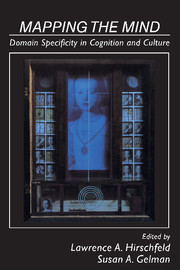Book contents
- Frontmatter
- Contents
- List of contributors
- Preface
- Part I Overview
- Part II The origins of domain knowledge: Biology and evolution
- Part III The origins of domain knowledge: Conceptual approaches
- Part IV Are domains theories?
- Part V Domains across cultures and languages
- 14 First principles can support both universal and culture-specific learning about number and music
- 15 Cognitive constraints on cultural representations: Natural ontologies and religious ideas
- 16 Universal and culture-specific properties of children's mental models of the earth
- 17 Cognitive domains and the structure of the lexicon: The case of the emotions
- Part VI Implications for education
- Author index
- Subject index
17 - Cognitive domains and the structure of the lexicon: The case of the emotions
Published online by Cambridge University Press: 04 August 2010
- Frontmatter
- Contents
- List of contributors
- Preface
- Part I Overview
- Part II The origins of domain knowledge: Biology and evolution
- Part III The origins of domain knowledge: Conceptual approaches
- Part IV Are domains theories?
- Part V Domains across cultures and languages
- 14 First principles can support both universal and culture-specific learning about number and music
- 15 Cognitive constraints on cultural representations: Natural ontologies and religious ideas
- 16 Universal and culture-specific properties of children's mental models of the earth
- 17 Cognitive domains and the structure of the lexicon: The case of the emotions
- Part VI Implications for education
- Author index
- Subject index
Summary
… I necessarily arrived at this remarkable thought, namely, that a kind of alphabet of human thoughts can be worked out and that everything can be discovered and judged by a comparison of the letters of this alphabet and an analysis of the words made from them.
(Leibniz, 1956: 342)Introduction
How is knowledge stored and organized in the human mind? By knowledge I do not mean school knowledge or book knowledge, but the basic everyday knowledge that provides us with a frame of orientation in daily life, in interaction with other people, in our natural modus operandi.
In my view, there can hardly be a better way of approaching this question than by analyzing language (and languages). “Languages are the best mirror of human mind … and precise analysis of the meanings of words would allow us – better than anything else – to know the operations of the mind” (Leibniz, 1949: 368).
In language, grammar provides a basic framework for the interpretation of the world and of human existence in the world, with its fundamental semantic categories such as person, number, gender, tense, aspect, mood, “evidentiality,” degree, and so on (cf. Jespersen, 1924), whereas the lexicon divides and organizes the “contents of the world” into more or less coherent and selfcontained domains. By studying the structure of the lexicon, we can discover what these domains are and how they are organized, and thus reveal fundamental aspects of human interpretation of the world and the organization of knowledge and experience.
- Type
- Chapter
- Information
- Mapping the MindDomain Specificity in Cognition and Culture, pp. 431 - 452Publisher: Cambridge University PressPrint publication year: 1994
- 6
- Cited by



